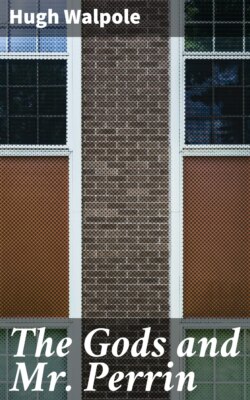Читать книгу The Gods and Mr. Perrin - Hugh Walpole - Страница 8
На сайте Литреса книга снята с продажи.
I.
ОглавлениеTable of Contents
IT would be fitting at this moment, were it possible, to give Traill's impressions, at the end of the first week, of the place and the people. But here one is met by the outstanding and dominating difficulty that Traill himself was not given to gathering impressions at all—he felt things, but he never saw them; he recorded opinions in simple language and an abbreviated vocabulary, but it was all entirely objective; motives, the way that things hung and were interdependent one upon the other, the sense of contrast and of the incessant jostling of comedy on tragedy and of irony upon both, never hit him anywhere.
Nevertheless, he had, in a clear, clean-cut way, his opinions at the end of the first week.
There is a letter of his to a college friend that is interesting, and there are some other things in a letter to his mother; but he was engaged, quite naturally, in endeavoring to keep up with the confusing medley of “things to be done and things not to be done” that that first week must necessarily entail.
His relations to Perrin and Perrin's relations to him are, it may be said here now, once and for all, the entire motif of this episode—it is from first to last an attempt to arrive at a decision as to the real reasons of the catastrophe that ultimately occurred; and so, that being the case, it may seem that the particulars as to the rest of the people in the place, and, indeed, the place itself, are extraneous and unnecessary; but they all helped, every one of them, in their own way and their own time, to bring about the ultimate disaster, and so they must have their place.
Traill had learnt during his three years at Cambridge that, above all things, one must not worry. He had been inclined, a little at first, to think, after the easy indolence of Clifton, that one ought to bother. He had found that two thirds in his Historical Tripos and a “Blue” for Rugby football were very easily; obtained; he found that the second of these things led to a popularity that invited a pleasant indifference to thought and discussion, and he was extremely happy.
His “Blue” would undoubtedly have secured him something better than a post at Moffatt's had he taken more trouble; but He had left it, lazily, until the last and had been forced to accept what he could get; in a term or two he hoped to return to Clifton.
All this meant that his stay at Moffatt's was in the nature of an interlude. He buoyantly regarded it as a month or two of “learning the ropes,” and he could not therefore he expected to regard masters, boys, or buildings with any very intense seriousness. It is, indeed, one of the most curious aspects of the whole affair that he remained, for so long a period, blind to all that was going on.
In his motives, in his actions, he was of a surprising simplicity. He found the world an entirely delightful place—there was Rugby football in the winter, and cricket in the summer; there were splendid walks; there was a week in town every now and again; as to people, there was his mother—a widow, and he was her only son—whom he entirely worshiped; there were one or two excellent friends of his from Clifton and Cambridge; there was no one whom he really disliked; and there were one or two girls, hazily, not very seriously, in the distance, whom he had liked very much indeed.
He read a little—liked it when he had time; had a passion for Napoleon, whose campaigns he had followed confusedly at Cambridge; and was even stirred—again when he had time—by certain sorts of poetry.
And it is this that leads me to one of the questions that are most difficult of decision—as to how strongly, if indeed at all, he had any feeling for beauty before he met Isabel Desart.
He certainly—if he had it at this time—could not put it into words; but I believe that he had, in the back of his brain, a kind of consciousness about it all, and his meeting with Isabel fired what had been lying there waiting.
He never, certainly, talked about it, but it will be noticed that he went to the wood a great many times, even before he felt Isabel's influence, and that he realized quite vividly certain aspects of Pendragon and the Flutes; and he would not have cared for Richard Feverel quite so passionately had he not had something—some poetry and feeling—already in him.
The reverse of the shield is, at any rate, given in that first letter to his mother. He says of Moffatt's: “You never saw anything so hideous. The red brick all looks so fresh, the stone corridors all smell so new, the iron and brass of the place is all so strong and regular. It's like the labs at Cambridge on an extensive scale; you'd think they were inventing gases or something, not teaching boys the way they should go.... All the same, coming up the hill the other night, with the sun setting behind it, it looked quite black and grand—it 's the fresh-lobster color of it that I can't stand...”
That shows that he was, to some degree at any rate, sensitive to the way that the place looked, and he, in all probability, felt a great deal more about it than he ever said to anyone.
Cambridge may have done something for him—few people can spend three years with these gray palaces and blue waters without some kind of development, although probably—because we are English—it is unconscious.
